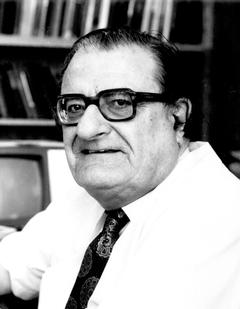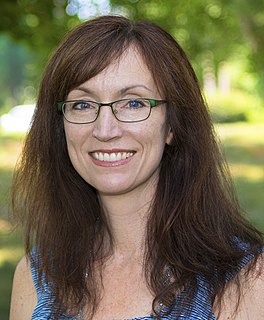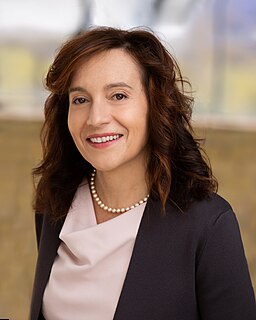
Michael James Steuart Dewar was an American theoretical chemist.
Leo Radom is a computational chemist and Emeritus Professor of Chemistry at the University of Sydney. He attended North Sydney Boys High School. He has a PhD and a DSc from the University of Sydney and carried out postdoctoral research under the late Sir John Pople. Previously, he was Professor at the Research School of Chemistry at the Australian National University in Canberra, Australia. He has published over 460 papers.
Paul von Ragué Schleyer was an American physical organic chemist whose research is cited with great frequency. A 1997 survey indicated that Dr. Schleyer was, at the time, the world's third most cited chemist, with over 1100 technical papers produced. He was Eugene Higgins Professor of Chemistry at Princeton University, Professor and co-director of the Institute for Organic Chemistry at the University of Erlangen–Nuremberg in Germany, and later Graham Perdue Professor of Chemistry at the University of Georgia in Athens, Georgia. He published twelve books in the fields of lithium chemistry, ab initio molecular orbital theory and carbonium ions. He was past president of the World Association of Theoretically Oriented Chemists, a fellow of the International Academy of Quantum Molecular Science and editor-in-chief of the Encyclopedia of Computational Chemistry.

Henry Frederick "Fritz" Schaefer III is a computational and theoretical chemist. He is one of the most highly cited chemists in the world, with a Thomson Reuters H-Index of 121 as of 2020. He is the Graham Perdue Professor of Chemistry and Director of the Center for Computational Chemistry at the University of Georgia.
Norman "Lou" Allinger was an American organic and computational chemist and Distinguished Research Professor Emeritus of Chemistry at the University of Georgia (UGA) in Athens.

Anna I. Krylov is a Professor of Chemistry at the University of Southern California (USC), working in the field of theoretical and computational quantum chemistry. She is the inventor of the spin-flip method. Krylov is the president of Q-Chem, Inc. and an elected member of the International Academy of Quantum Molecular Science and the Academia Europaea.
Harden M. McConnell was an American physical chemist. His many awards included the National Medal of Science and the Wolf Prize, and he was elected to the National Academy of Science."

Jeehiun Katherine Lee is an organic chemist and a Professor in the Department of Chemistry at Rutgers University. She currently runs a research lab on the New Brunswick campus.
Peter John Stang is a German American chemist and Distinguished Professor of chemistry at the University of Utah. He was the editor-in-chief of the Journal of the American Chemical Society from 2002 to 2020.
Angela K. Wilson is an American physical, theoretical, and computational chemist. She is currently the John A. Hannah Distinguished Professor of Chemistry in the department of chemistry of Michigan State University. At Michigan State University, she also serves as the Associate Dean for Strategic Initiatives in the College of Natural Sciences, and as Director of the MSU Center for Quantum Computing, Science, and Engineering (MSU-Q), a newly formed center at MSU, stemming from MSU's long history in quantum computing research.

Garikapati Narahari Sastry is an Indian chemist. He has taken charge as Director of CSIR-North East Institute of Science and Technology, Jorhat, Assam on 19 February 2019. After taking charge as the Director, he has worked towards converting knowledge in the areas of computational modelling and Artificial intelligence from basic to translational research, by working closely with society and industry. Ultimately, revitalizing the strength of science and technology is essential in achieving the self-reliant and strong India. In the era of Industry 4.0 and 5.0, combining our traditional wisdom with modern science appear to be indispensable in the sectors such as Education, Health, Agriculture, Industrial and Societal development at large. Prior to joining as the Director, he headed the Molecular Modelling Division at the CSIR Indian Institute of Chemical Technology in Hyderabad, India. Sastry has made pioneering contributions in the areas of computational chemistry and computational biology.

Martin Gruebele is a German-born American physical chemist and biophysicist who is currently James R. Eiszner Professor of Chemistry, Professor of Physics, Professor of Biophysics and Computational Biology at the University of Illinois at Urbana-Champaign where he is the principal investigator of the Gruebele Group. The James R. Eiszner Endowed Chair was previously held by Peter Guy Wolynes.

Donald Gene Truhlar is an American scientist working in theoretical and computational chemistry and chemical physics with special emphases on quantum mechanics and chemical dynamics.
Sharon Hammes-Schiffer is a physical chemist who has contributed to theoretical and computational chemistry. She is currently a Sterling Professor of Chemistry at Yale University. She has served as senior editor and deputy editor of the Journal of Physical Chemistry and advisory editor for Theoretical Chemistry Accounts. As of 1 January 2015 she is editor-in-chief of Chemical Reviews.

Emily Ann Carter is the Gerhard R. Andlinger Professor in Energy and the Environment and a professor of Mechanical and Aerospace Engineering, the Andlinger Center for Energy and the Environment, and the Program in Applied and Computational Mathematics at Princeton University. She has been on the faculty at Princeton since 2004, including as serving as Princeton's Dean of the School of Engineering and Applied Science from 2016 to 2019. She moved to UCLA to serve as Executive Vice Chancellor and Provost and a distinguished professor of chemical and biomolecular engineering, before returning to Princeton in December 2021. Carter is a theorist and computational scientist whose work combines quantum mechanics, solid-state physics, and applied mathematics.

Neil K. Garg is currently a Distinguished professor of chemistry and holds the Kenneth N. Trueblood Endowed Chair at the University of California, Los Angeles. Garg's research is focused on the chemical synthesis of organic compounds, with an emphasis on the development of new strategies for the preparation of complex molecules possessing unique structural, biological, and physical properties. His group has made breakthroughs in catalysis and in the understanding and utilization of strained intermediates, such as arynes, cyclic alkynes, and cyclic allenes. His laboratory has completed the total syntheses of many natural products, including welwitindolinones, akuammilines, and tubingensin alkaloids.

Marcey Lynn Waters is the Glen H. Elder Jr., Distinguished Professor of Chemistry at the University of North Carolina, Chapel Hill (UNC-CH). She is an organic chemist whose research is at the interface of chemical biology and supramolecular chemistry. Waters has received multiple awards, for research, teaching, and advocating for women in science. She is serving the President of the American Peptide Society from 2017-2019.
Luis M. Campos is an Associate Professor in the Department of Chemistry at Columbia University. Campos leads a research team focused on nanostructured materials, macromolecular systems, and single-molecule electronics.

Laura Gagliardi is an Italian theoretical and computational chemist and Richard and Kathy Leventhal Professor of Chemistry and Molecular Engineering at the University of Chicago. She is known for her work on the development of electronic structure methods and their use for understanding complex chemical systems.

Imre Gyula Csizmadia was a Canadian Hungarian chemist, university professor, external member of the Hungarian Academy of Sciences.












